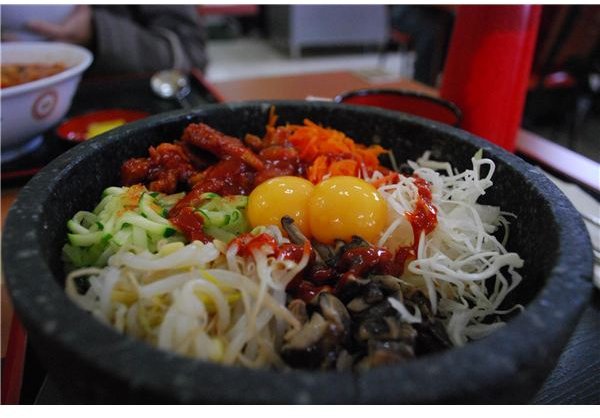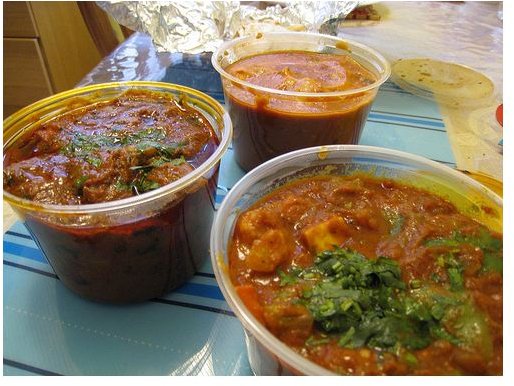What are the Health Benefits of Spicy Foods? Part 1 of 2
Many of the health benefits of spicy foods come from the ingredient capsaicin. Capsaicin raises the temperature, and a single drop of pure capsaicin can burn a hole through healthy tissue.
Image Credit: flickr.com/Mack Male
Weight Loss
Consumption of spicy food aids weight-loss. The capsaicin present in spicy food burns up body calories faster and increases metabolism, with the result that an addition of a teaspoon of cayenne pepper to a meal causes the body to burn an additional 15 calories.
Research at Oxford Polytechnic Institute concludes that consumption of chilies increases thermogenesis, or the body’s caloric burn rate, by about 25 percent.
Improved Blood and Heart Functions
The burning property of capsaicin helps to dissolve blood clots and fight inflammation. This improves blood circulation and lowers blood pressure, improving the functioning of the heart and reducing the risk of heart attacks.
The oxidation of low-density cholesterol (LDL), or bad cholesterol, can clog arteries and increase the chances of heart attacks and strokes. Chili is a good source of soluble fiber that helps lower cholesterol levels. Research substantiates that chili causes LDL to resist oxidation, further reducing the risk of heart attack and stroke. Chili peppers also contain good amounts of vitamin A beta-carotene and vitamin C that strengthen blood vessel walls and remove plaque. Pepper, in fact, contains two and a half time more vitamin C than an orange does.
Statistics show that cultures having spicy foods as part of their traditional diet have a much lower rate of heart attack and stroke compared to cultures that predominantly eat non-spicy or bland food, substantiating the theory that the consumption of spicy foods reduces the risk of heart attacks and strokes.
Improved Breathing
The hot temperature of spicy food promotes sweating and thereby eases the discomfort of cold and flu symptoms.
Hot peppers also contribute to bringing up mucus and other material from the lungs, bronchi, and trachea, and opening clogged nasal passages. This helps people suffering from asthma, chronic bronchitis, sinusitis, and other respiratory conditions breathe easier.
The fact that spicy food promotes breathing is vouched for by popular opinion throughout the ages. Preliminary scientific research on laboratory animals in Sweden confirms the ability of capsaicin to cure asthma and alleviate hypersensitive airways.
Digestion
The parietal cells of the human body produce hydrochloric acid that helps to break down food and improve digestion. Consumption of spices boosts blood flow into the stomach, bolstering the mucous lining and increasing the secretion of hydrochloric acid by the cells, which contributes to improving digestion. The burning property of capsaicin inherent in the spice also kills bacteria like H. pylori that cause stomach ulcers.
The health benefits of spicy foods with relation to digestion, however, remains controversial and is not yet conclusively proven. For some individuals, consumption of strong, strong spicy food could actually have the opposite effect and cause heartburns or inflammation in the stomach lining. One solution to overcome the ill-effects of spicy foods on digestion is by consuming spicy food with absorbent foods such as bread or rice that help spread the capsaicin.
Hot spicy food, nevertheless, preserves the food and delays food spoilage, and as such, reduces the risk of infection inherent in consuming stale food. This is another benefit of eating spicy food.
Continue to Page 2 for more health benefits of spicy food
Cancer

Recent research indicates that the health benefits of spicy foods extend to fighting cancer. Regular consumption of spicy food, such as chilies and curries, causes capsaicin to kill or at least slow down the growth of cancer cells in the body.
Experiments at Cedars-Sinai Medical Center in Los Angeles provide some evidence to support the ability of capsaicin to halt prostate cell replication and encourage programmed cell death. Countries with traditional spicy fare have a lower incidence of some cancers in their population, which substantiates such findings.
Image Credit: Wikimedia Commons
Pain Management
The ability of capsaicin to reduce inflammation finds use in traditional medicine to manage pain. This, combined with the salicylates found in chilies that boost the levels of endorphins and serotonin in the body to dull pain, ensures that consumption of spicy food brings pain relief. This includes relief from the pain of migraines and cluster headaches, as well as alleviating the pain associated with arthritis.
Warning and Disclaimers
The health benefits of spicy food come only when it is eaten in moderation. Excessive consumption of spicy food can cause heartburn and other serious complications, and some people have a low tolerance for spicy food.The effects of spicy food may also vary dpending on the condition of the person. Read this Bright Hub article to find out whether the consumption of spicy food is safe for pregnant women.
Consult a registered dietician before shifting to a diet of spicy food. This article is not intended to treat, and the health benefits mentioned here may not apply to all individuals.
References
- Surh, Young-Joon. “More Than Spice: Capsaicin in Hot Chili Peppers Makes Tumor Cells Commit Suicide.” JNCI J Natl Cancer Inst (2002) 94 (17): 1263-1265. doi: 10.1093/jnci/94.17.1263. Retreived from https://jnci.oxfordjournals.org/content/94/17/1263.full on 16 December 2010.
- Swan. Darren. “Peppers are hot – as a health and diet aid.” https://news.medill.northwestern.edu/chicago/news.aspx?id=62587.Retrieved 16 December 2010.
- Kilham, Chris. Chiles Cures Almost All – But Some Are So Hot it Can Blow Your Head Off. https://latino.foxnews.com/latino/health/2010/12/16/chiles-cures-blow-head/. Retrieved 16 December 2010.
- Brody, Jane, E. “Eating Spicy Food. What are the Effects.” The New York Times. https://www.nytimes.com/1983/09/21/garden/eating-spicy-food-what-are-the-effects.html?pagewanted=all. Retrieved 16 December 2010.
